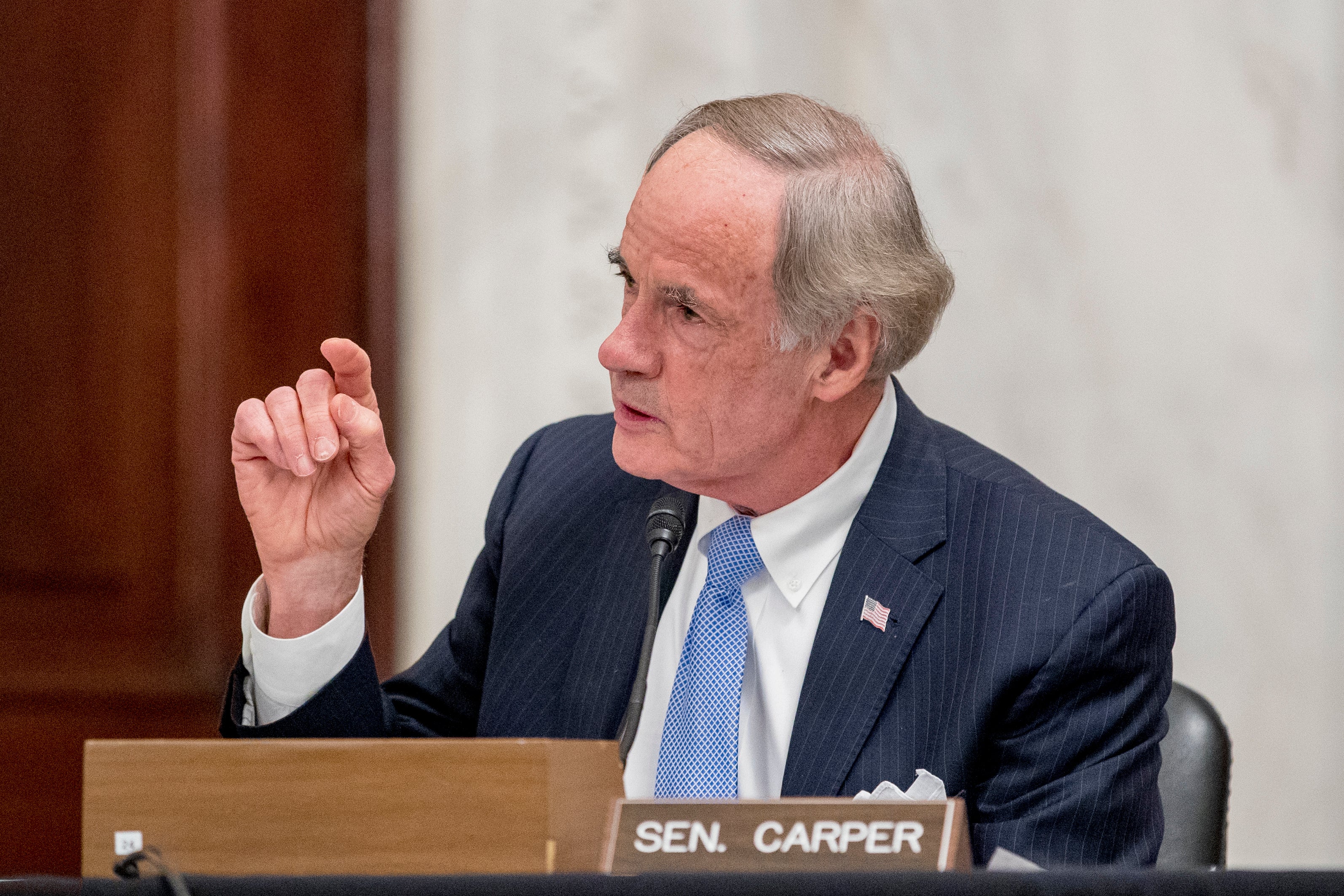Carper urges tough US rules barring gas-powered cars by 2035
A top Senate Democrat is urging U.S. anti-pollution standards that would follow a deal brokered by California with five automakers and then set targets to end sales of new gasoline-powered vehicles by 2035

Your support helps us to tell the story
This election is still a dead heat, according to most polls. In a fight with such wafer-thin margins, we need reporters on the ground talking to the people Trump and Harris are courting. Your support allows us to keep sending journalists to the story.
The Independent is trusted by 27 million Americans from across the entire political spectrum every month. Unlike many other quality news outlets, we choose not to lock you out of our reporting and analysis with paywalls. But quality journalism must still be paid for.
Help us keep bring these critical stories to light. Your support makes all the difference.
A top Senate Democrat is urging U.S. anti-pollution standards that would follow a deal brokered by California with five automakers and then set targets to end sales of new gasoline-powered vehicles by 2035, a goal that reaches farther than President Joe Biden’s climate plan.
In a letter sent late Thursday to the Environmental Protection Agency, Delaware Sen. Tom Carper who chairs the Senate Environment and Public Works Committee, says the administration must move forcefully in the auto sector to achieve Biden’s plan of slashing America’s greenhouse gas emissions in half by 2030.
Carper notes that the industry is already moving in the direction of zero-emission electric vehicles and that it's critical to lay markers now to ensure that the U.S. positions itself as a top player in auto manufacturing over foreign competitors such as China.
“Strong policies in the United States will encourage those investments to be made here,” Carper wrote in the letter to EPA Administrator Michael Regan, which was obtained by The Associated Press. He cited likely U.S. gains in “research and development, manufacturing and ultimately export opportunities in automotive technology.”
Under Carper’s proposal, the EPA would apply California’s 2019 framework agreement on emissions standards reached between Ford, Volkswagen, Honda, BMW and Volvo. That deal would cut greenhouse gas emissions by 3.7% per year from 2022 through 2026 and raise fuel economy requirements by a like amount.
After that, the administration would have to have much stricter standards to meet goals spelled out in Carper’s plan. Half of all new vehicles sold would be electric by 2030, and sales of new gasoline-powered passenger vehicles would be banned by 2035. Under the deal with California, automakers would get credits toward meeting the requirements for selling zero-emissions battery electric and hydrogen fuel cell vehicles.
“If the U.S. does not establish a robust policy that leads to zero emission vehicle deployment, combined with appropriate incentives, we will be at risk of losing our automotive jobs and industry leadership to other nations, as well as enduring unnecessary public health impacts from pollution,” Carper wrote.
Carper’s push comes as the Biden administration takes steps to reverse former President Donald Trump’s bid to end California’s ability to set its own automobile tailpipe pollution standards. That move could pave the way for the U.S. to broker an industrywide deal that follows California’s agreement, although reaching such an agreement faces challenges.
Most of the rest of the auto industry, for instance, opposed the California deal and sided with Trump in rolling back the standards to a 1.5% increase in fuel economy per year through 2026. In early talks with the Biden administration last month, a coalition of automakers said it wanted mileage standards lower than those brokered by California.
Biden has said he wants stronger standards to deal with the effects of climate change, and in his address to Congress on Wednesday he said the U.S. “can own the electric car market.” His climate proposal, however, does not detail the greenhouse gas reductions that his administration envisions for each sector of the economy. Biden’s top climate adviser, Gina McCarthy, appeared to signal that deeper cuts in emissions would have to come from sectors other than the auto industry to reach the goals.
To increase sales of electric vehicles, the administration plans to spend $15 billion to build a half-million charging stations by 2030 as well as offer unspecified tax credits and rebates to cut the cost.
However, experts say it will be difficult to replace the 279 million passenger vehicles now on U.S. roads — most of which burn gasoline — with electric vehicles in less than 15 years. The average U.S. vehicle is now nearly 12 years old, so they stay on the roads longer than in the past. And without an immediate change, the number of gasoline-powered vehicles will continue to grow. IHS Markit predicts it will be 284 million by 2025.
Each year, automakers sell about 17 million new vehicles in the U.S., most of them running on gasoline. If every new vehicle sold were electric starting today, it would take more than 16 years to replace all the gasoline vehicles.
___
Krisher reported from Detroit. AP writer Matthew Daly contributed to this report.
Subscribe to Independent Premium to bookmark this article
Want to bookmark your favourite articles and stories to read or reference later? Start your Independent Premium subscription today.